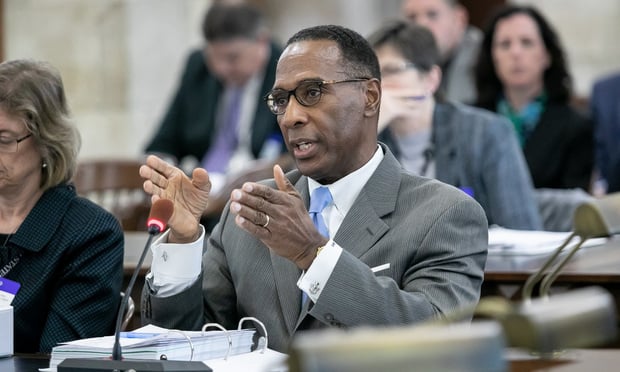Progress Made, But Work Remains on Foreclosures, NJ Court Committee Says
"The recommendations set forth by this committee will further improve on efforts to resolve housing disputes in a fair and equitable manner that benefits homeowners, lenders and communities throughout New Jersey," said the chairman of the committee, Appellate Division Judge Glenn Grant, the acting administrative director of the courts, in a statement.
September 20, 2018 at 02:34 PM
4 minute read
 Glenn A. Grant, acting administrative director of the New Jersey courts/photo by Carmen Natale
Glenn A. Grant, acting administrative director of the New Jersey courts/photo by Carmen Natale
Citing the need for further progress in addressing New Jersey's residential foreclosure crisis, a state Supreme Court committee on Thursday issued a series of recommendations aimed at continuing to reduce the number of homeowners in danger of losing their homes and for streamlining the foreclosure process.
The court's Special Committee on Residential Foreclosures—created by Chief Justice Stuart Rabner in May 2017—issued a list of 17 recommendations, which it said were needed to continue an ongoing crisis.
Some of those proposals include:
- Revising the Fair Foreclosure Act to require filing within six months of the notice of intent to foreclose, or service of a new notice;
- Codifying the procedures for foreclosure sales to ensure that sheriff's sales occur within 120 days, as is currently required by law;
- Revising statutes and rules to make it easier for lenders to seize and sell homes that clearly have been abandoned;
- Amending court rules to reduce the notice requirement for entry of judgment from 30 days to 10 days;
- Expanding the authority of the Superior Court Clerk's Office to improve oversight of backlogged cases.
“The recommendations set forth by this committee will further improve on efforts to resolve housing disputes in a fair and equitable manner that benefits homeowners, lenders and communities throughout New Jersey,” said the chairman of the committee, Appellate Division Judge Glenn Grant, the acting administrative director of the courts, in a statement.
The committee was made up of those involved in handling foreclosure matters: lawyers, legislative leaders, lenders, sheriffs and judiciary personnel.
Some of the recommendations would require action by either the Legislature or the governor's office, while others can be implemented by the judiciary through court rule amendments, the panel noted.
The number of residential foreclosures erupted in the wake of the nationwide financial crisis of 2008.
“The foreclosure explosion necessitated swift and multifaceted action by the executive, legislative and judicial branches,” the committee said in its report.
One of the first steps the judiciary took was to create a mediation program in which lenders and homeowners were encouraged to work together to avoid foreclosures and negotiate new payment plans.
The report noted that in 2006, two years before the mortgage crisis began, the judiciary handled about 25,000 foreclosures.
After the collapse of the market, the number of foreclosures skyrocketed to more than 65,000, the report said.
“After the judiciary created its mediation program and lawmakers took other corrective action, the number of actions were reduced and the backlog was addressed,” the report said.
“Over the past decade, the executive, legislative and judicial branches have worked together to improve the foreclosure process in New Jersey,” the report said.
The committee said that in 2011, there were 144,032 foreclosure claims filed in New Jersey; as of June 2018, that number had decreased to 20,949 residential foreclosure claims.
Additionally, the committee said, the time between the filing of a foreclosure claim to closure dropped from 1,360 days to 148 days.
But, “despite progress, fallout from the foreclosure crisis remains a significant problem in need of continued remediation,” the committee said in its report.
A high rate of unresolved foreclosure actions results in reduced property values, an increased tax burden on local governments, and a decreased quality of life for local residents, especially if homes are sitting abandoned, the report said.
This content has been archived. It is available through our partners, LexisNexis® and Bloomberg Law.
To view this content, please continue to their sites.
Not a Lexis Subscriber?
Subscribe Now
Not a Bloomberg Law Subscriber?
Subscribe Now
NOT FOR REPRINT
© 2025 ALM Global, LLC, All Rights Reserved. Request academic re-use from www.copyright.com. All other uses, submit a request to [email protected]. For more information visit Asset & Logo Licensing.
You Might Like
View All


On the Move and After Hours: Buchanan; Malamut Law; Genova Burns; Faegre Drinker
3 minute readTrending Stories
- 1Uber Files RICO Suit Against Plaintiff-Side Firms Alleging Fraudulent Injury Claims
- 2The Law Firm Disrupted: Scrutinizing the Elephant More Than the Mouse
- 3Inherent Diminished Value Damages Unavailable to 3rd-Party Claimants, Court Says
- 4Pa. Defense Firm Sued by Client Over Ex-Eagles Player's $43.5M Med Mal Win
- 5Losses Mount at Morris Manning, but Departing Ex-Chair Stays Bullish About His Old Firm's Future
Who Got The Work
J. Brugh Lower of Gibbons has entered an appearance for industrial equipment supplier Devco Corporation in a pending trademark infringement lawsuit. The suit, accusing the defendant of selling knock-off Graco products, was filed Dec. 18 in New Jersey District Court by Rivkin Radler on behalf of Graco Inc. and Graco Minnesota. The case, assigned to U.S. District Judge Zahid N. Quraishi, is 3:24-cv-11294, Graco Inc. et al v. Devco Corporation.
Who Got The Work
Rebecca Maller-Stein and Kent A. Yalowitz of Arnold & Porter Kaye Scholer have entered their appearances for Hanaco Venture Capital and its executives, Lior Prosor and David Frankel, in a pending securities lawsuit. The action, filed on Dec. 24 in New York Southern District Court by Zell, Aron & Co. on behalf of Goldeneye Advisors, accuses the defendants of negligently and fraudulently managing the plaintiff's $1 million investment. The case, assigned to U.S. District Judge Vernon S. Broderick, is 1:24-cv-09918, Goldeneye Advisors, LLC v. Hanaco Venture Capital, Ltd. et al.
Who Got The Work
Attorneys from A&O Shearman has stepped in as defense counsel for Toronto-Dominion Bank and other defendants in a pending securities class action. The suit, filed Dec. 11 in New York Southern District Court by Bleichmar Fonti & Auld, accuses the defendants of concealing the bank's 'pervasive' deficiencies in regards to its compliance with the Bank Secrecy Act and the quality of its anti-money laundering controls. The case, assigned to U.S. District Judge Arun Subramanian, is 1:24-cv-09445, Gonzalez v. The Toronto-Dominion Bank et al.
Who Got The Work
Crown Castle International, a Pennsylvania company providing shared communications infrastructure, has turned to Luke D. Wolf of Gordon Rees Scully Mansukhani to fend off a pending breach-of-contract lawsuit. The court action, filed Nov. 25 in Michigan Eastern District Court by Hooper Hathaway PC on behalf of The Town Residences LLC, accuses Crown Castle of failing to transfer approximately $30,000 in utility payments from T-Mobile in breach of a roof-top lease and assignment agreement. The case, assigned to U.S. District Judge Susan K. Declercq, is 2:24-cv-13131, The Town Residences LLC v. T-Mobile US, Inc. et al.
Who Got The Work
Wilfred P. Coronato and Daniel M. Schwartz of McCarter & English have stepped in as defense counsel to Electrolux Home Products Inc. in a pending product liability lawsuit. The court action, filed Nov. 26 in New York Eastern District Court by Poulos Lopiccolo PC and Nagel Rice LLP on behalf of David Stern, alleges that the defendant's refrigerators’ drawers and shelving repeatedly break and fall apart within months after purchase. The case, assigned to U.S. District Judge Joan M. Azrack, is 2:24-cv-08204, Stern v. Electrolux Home Products, Inc.
Featured Firms
Law Offices of Gary Martin Hays & Associates, P.C.
(470) 294-1674
Law Offices of Mark E. Salomone
(857) 444-6468
Smith & Hassler
(713) 739-1250







